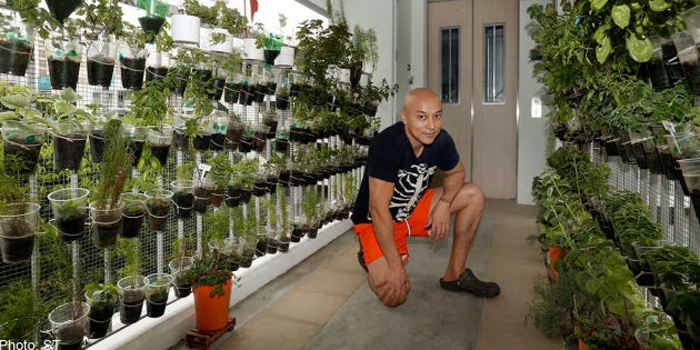
Farm in the city
A slew of edible gardens is burnishing Singapore’s reputation as a garden city.
Over the last two to three years, more than 80 plots with fruits, herbs and vegetables have sprung up not only in private and public housing estates, but also in eateries, malls, schools and offices as urban farming takes off here.
Just last month, the Singapore Management University launched such a garden, about the size of a basketball court, outside the School of Accountancy and Law building along Queen Street.
Companies that help build and maintain these urban farms, which typically range from a few hundred to a few thousand sq ft, report a growing interest.
For instance, Edible Garden City, UGrowGardens and Plantvisionz say they had only a handful of projects when they started a few years ago.
Last year, each handled more than 10 projects.
A Facebook page called Grow Your Own Food In Singapore, set up by environmentalist Bhavani Prakash, 44, has garnered more than 1,200 likes since it was started in 2013.
The National Parks Board’s Community In Bloom programme, a nationwide gardening programme which started in 2005, has also seen the creation of more than 700 gardens all over the island.
People want to grow their own food for various reasons, says former aerospace engineer James Lam, 55, who founded UGrowGardens in 2013.
He says: “Chefs and homeowners want fresh produce for their kitchens. Companies use the gardens to help their staff relieve stress.
“Schools use them as a tool to teach teamwork or as part of community service, when they get their students to take the harvests to the poor.
“It is also a good way to promote community bonding and for neighbours to get to know one another.”
Some property developers are also beginning to see the value of turning their ornamental rooftop space into a productive food garden, says Mr Bjorn Low, 35, who founded Edible Garden City with former landscape designer Robert Pearce, 38, in 2012.
He says: “Instead of paying a landscape firm to maintain an ornamental garden, they pay us to maintain a food garden and in the process, they can also use the space to conduct value-added events on food growing for their tenants.”
The social enterprise is in negotiations with the management of Bugis Village to start a commercial farm at a 10,000 sq ft space on the rooftop of its multi-storey carpark.
The farm will supply fresh vegetables and herbs to eateries nearby.
If successful, it will not be the only commercial urban farm in town.
Singapore’s first commercial urban rooftop farm was set up by social enterprise Comcrop at youth hub *Scape in Orchard Link last April.
The 6,000 sq ft farm now churns out 10kg each of basil and mint every day that it supplies to about 30 restaurants and hotels nearby.
Meanwhile, a 5,800 sq ft rooftop farm called G.R.E.E.N.S by two entrepreneurs started running last August at Bugis Cube mall.
Observers trace the growing popularity of urban farms here to several factors, including a growing awareness of how the heavy use of pesticides and fertilisers can harm health and the environment.
Says Ms Prakash, who grows vegetables, fruits and herbs on the balcony of her condominium unit: “When you grow your own food, you are more careful about what you put into the soil because you know you are going to eat it.”
Other factors include the worldwide food security crisis in 2007, which caused disruptions in the supply of rice and other food products here, as well as recent food contamination scares, says Professor Paul Teng, a food security expert from the National Institute of Education.
“They made Singaporeans realise that some level of self-sufficiency was important,” he says.
Information on how to grow your own food is also more easily available these days.
HortPark in the Alexandra Road area holds guided tours to its vegetable garden. The public can also sign up for related talks and demonstrations at its Gardeners’ Day Out event, held once every two months.
Edible Garden City has been running free sessions on food growing too. On Feb 21, it will pilot a formal course on urban farming for the public over six weekends at a shophouse in Rowell Road.
Each session, to be held over four hours on Saturday and Sunday, is tentatively priced at $40.
By the end of the year, it will also pilot an urban food trail linking Comcrop and at least four herb gardens in town.
Leia mais Asia One

